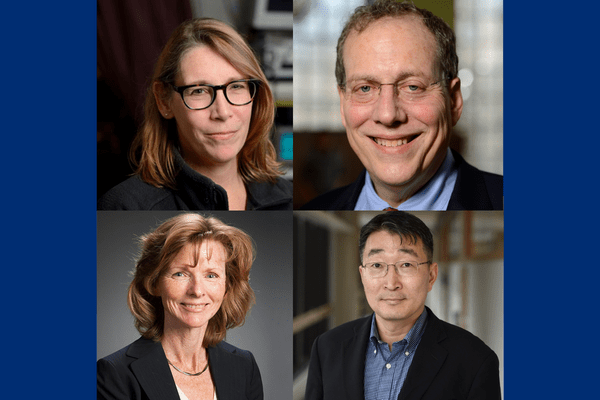Four from Hopkins BME elected to AIMBE College of Fellows

Four biomedical engineering faculty members have been elected to the American Institute for Medical and Biological Engineering 2024 College of Fellows. Election to AIMBE is among the highest professional distinctions accorded to medical and biomedical engineers and recognizes the top 2% of engineers in these fields. It honors those who have made outstanding contributions to engineering and medicine research, practice, or education.
Fellows will be honored during an induction ceremony today at the AIMBE Annual Event in Arlington, Virginia. The four BME fellows are:
Kathleen Cullen
Kathleen Cullen, professor of biomedical engineering, studies how the brain integrates multi-sensory information to ensure the maintenance of balance and posture, as well as perceptual stability in everyday life. Specifically, her lab focuses on understanding the neural encoding of vestibular information, and how this information is combined with proprioceptive, visual, and motor signals to generate neural representations of our motion.
She was recognized “for pioneering contributions in basic vestibular science on how the brain encodes self-motion information and to drive innovative translational developments.”
Andrew Feinberg
Andrew Feinberg, Bloomberg Distinguished Professor of Epigenetics, is considered to be a founder of the field of cancer epigenetics, which is the study of heritable changes in gene expression—active versus inactive genes—that do not involve changes to the underlying DNA sequence. He contributes his expertise in human epigenetics to cutting-edge research in cancer and applies these concepts to understand the role of epigenetics in all aspects of human disease. Feinberg was the first to demonstrate how genetics, epigenetics, and the environment interact to cause disease, and he pioneered the field of epigenomics, developing many of the experimental and statistical tools to study epigenetics at a genome-scale level.
He was recognized “for founding the field of cancer epigenetics, pioneering molecular and computational tools driving modern epigenomics, and applying them to disease.”
Eileen Haase
Eileen Haase, teaching professor and vice chair for academic programs in the Department of Biomedical Engineering and chair of the Engineering for Professionals Applied Biomedical Engineering program, is an award-winning educator known for incorporating team-based learning and other active learning methods in her classes. As the vice chair of academic programs and a teaching professor, she is responsible for curriculum development and implementing proven active learning methods in the classroom. Haase was the principal investigator in the development of the BME Design Studio, has been awarded numerous technology fellowships to work with students developing extensive online and classroom resources, and taught as a Fulbright Scholar in Uganda.
She was recognized “for outstanding contributions to biomedical engineering education in the U.S. and Africa and numerous innovations in undergraduate and graduate teaching.”
Deok-Ho Kim
Deok-Ho Kim’s research spans the disciplinary boundaries between nanotechnology, biomaterials, and mechanobiology, with an emphasis on applications to tissue engineering and regenerative medicine. His lab focuses on the development and application of bio-inspired materials and devices and functional tissue engineering models for elucidating regenerative biology, drug screening, disease modeling, and cell-based therapies.
Kim, professor of biomedical engineering, was recognized “for outstanding contributions in developing microengineered biomaterials, advanced biofabrication technologies, and human microphysiological systems.”
